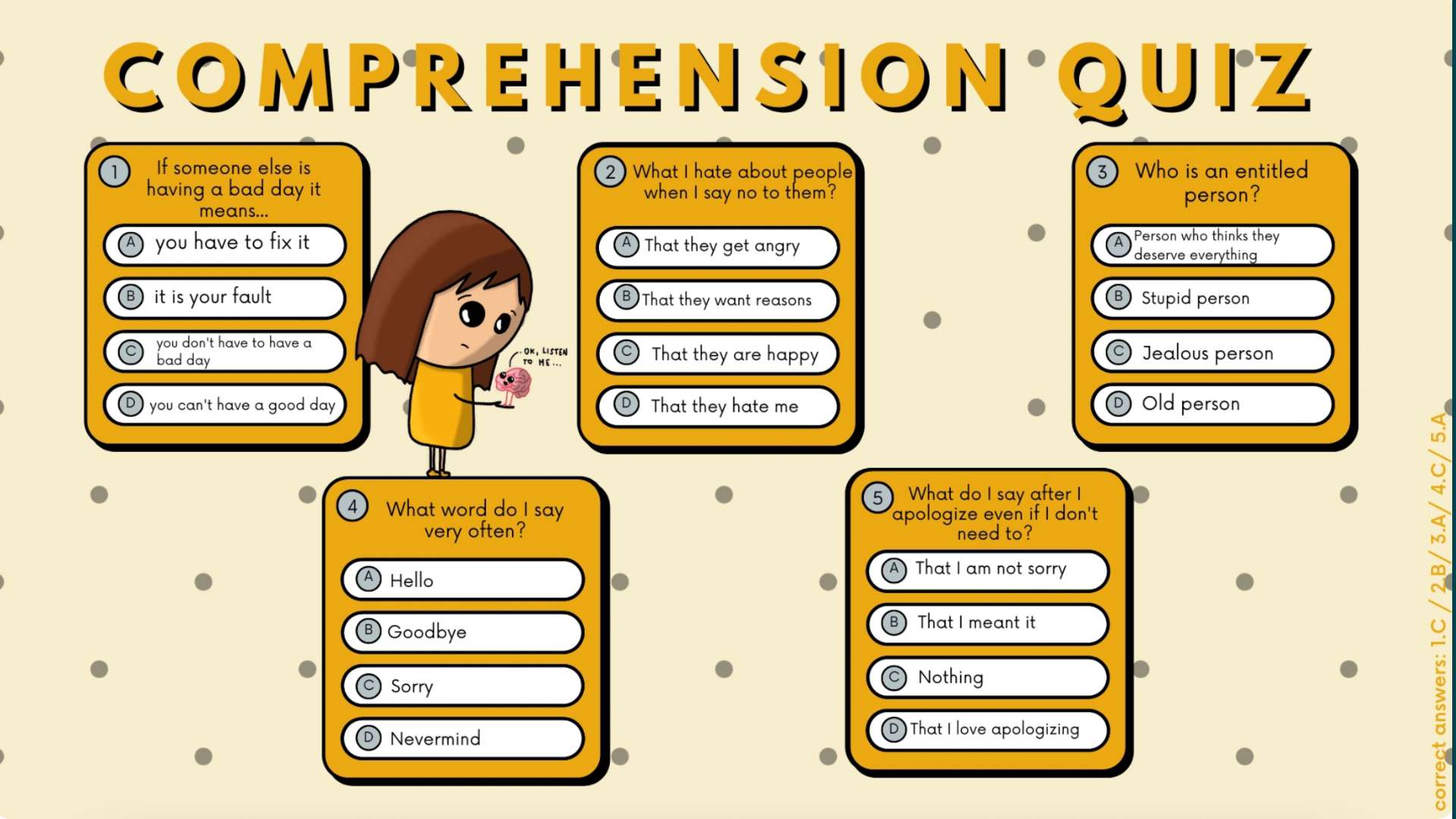
Welcome to one of the more personal episodes. Today you can listen to some things I learned through therapy. At most, it can help someone, at least, it can help you practice your English comprehension and maybe teach you some new words. Enjoy!
Also, you can find the vocabulary and comprehension quiz under the transcription!
(Česky: Najdete seznam slovíček a krátký kvíz porozumění pod přepisem)
¨
🎧LISTEN TO THE EPISODE HERE:


Hello and welcome to my podcast My Life and Other Funny Stories. My name is Dagmar Tomášková, I am an English tutor and coach and I created this podcast for students at intermediate and upper intermediate levels who want to get better in their oral comprehension. As always you can find the transcription of this episode, comprehension quiz, and vocabulary list in the notes of the podcast.
Today, I will talk about three things that I learned in therapy and that helped me immensely in my life. Hearing it is one thing, but realizing and implementing it into your life is the only way that will actually help you.
It could be possibly helpful for those of you, who might see similar patterns within your own personality.
Of course, I know probably a lot of you are nothing like me when it comes to behaviour or emotions but it can also give you an insight into what other people might be dealing with even if you are not.
Let’s goooo.
Number one. „The way others feel is their own business- it is not my problem“.
Where does it come from?
I always took responsibility for how other people around me felt. And I always tried to do whatever I could to make them happier even if it wasn’t possible. And then I felt like I was a failure and it ruined my whole day and all I could do was just to lay down and watch cat and dog videos. Also, I was always very scared to say things I wanted or I needed just because I was scared of other people’s reactions and that they would feel sad.
But I learned (not perfectly) to disconnect my own emotions and feelings from someone else’s. My therapist always said: „All right, so, if other people have a bad day, whose emotion is it? Is it your emotion? …yeah, that’s right. It is not. You have shit to do so if they are having a bad day and they don’t respond well to your attempts at helping, just let them have a bad day. It doesn’t mean you should have a bad day.
It was very liberating to realize that I am actually responsible only for my own emotions and how I handle them and not everyone’s emotions. Sometimes you can’t do anything to make someone feel better and that is okay.
Some of you might think: Oh my god, that is normal, why is it such a problem for you? Let me tell you, some people are really people-pleasers and they want everything nice and everyone to be happy and if it is not possible, it is a problem. And it took a longer time for me to understand that truly. I am not pizza, I can’t make everyone happy. Okay, that was awkward.
Number two: „There is nothing wrong with having boundaries and saying NO“
This sounds always so self-explanatory and everyone always say: it is okay to say no, just say no if you don’t want to do something.
I wish it was as easy as it is said.
It took me so many years to understand that I can say „no“ and I don’t have to explain myself.
For example:
Someone asks: Do you want to go there?
And I answer: No.
Then they go: Okay, why?
And there it is, always reasons, always explaining myself. What if I just don’t want to? What if it isn’t comfortable for me?
Everyone always wants reasons and if you don’t have reasons that they value as „good enough„, „no“ is not accepted.
And this social or any other pressure just makes me fucking mad. And I am really sorry for the swearing, generally I am really trying to avoid that, but it makes me angry. Why do people think they are entitled to your time or you doing something for them even if you don’t want to?
To be entitled to something means that someone believes that they are deserving of privileges or special treatment.
Saying „no“ is okay and it will always be okay and you don’t need to explain yourself. And if other people ask you and ask you and they push you into giving „good“ reasons (good reasons for them), well then let those people go, they are not good for you.
And you don’t have to say „yes“ just because of fear that you will lose the other person. They can handle it. And if they get mad, well then, back to the number one – you are not responsible for their feelings.
So that’s what I learned and I am finally learning to implement it – to include it- into my life.
And number three: You don’t have to say sorry for everything.
This is such an automatic response in my own vocabulary that I hadn’t even realized that I had been doing that until my therapist asked me: Why are you apologizing? Was it your fault?
Nope, it wasn’t.
It applies to big problems but also everyday things. I was always quick to apologize just because I didn’t want to be in conflict even if I was well aware of the fact that it was not my fault.
Yeah, but also then the tiny things. Imagine situation:
You are exercising in the gym and you are standing in front of some equipment that someone else wants to use. They come and ask me if they can use it. And I say: „Yes, of course, sorry, sorry.“
What was I apologizing for? For standing somewhere? for taking some space? It is not like I deliberately stood there in order to prevent everyone from using a machine or a piece of equipment.
Right, so I was apologizing for taking space.
For a while, it was really difficult for me to get rid of this habit. I always said „sorry“ and I hadn’t even realized that. So I started paying attention and every time I said it without actually carrying any blame, I immediately added: „No, I am NOT sorry, there is nothing to be sorry about.“
I know it sounds funny but it had to be done for me to realize how often I was saying it. And now I am more aware of that and I am trying not to apologize for things that aren’t my fault. Because if you do that, it is very easy to feel like you always have to be the one to apologize, that you don’t have the right to take up space in this world…and this is simply not true.
If you see yourself in those patterns, try to practice noticing it and then negating it, it really helps!
And that brings us to the end of the episode. If you want help with your English, write me a message or follow me on Instagram, where I post a lot of useful information such as how to write a good formal email, vocabulary for informal English, tips for traveling and learning languages and there is a lot more to come. So if you are interested, definitely follow me on my account dagmar_tomaskova – I will also link it to the notes.
Thank you so much for listening to this episode and don’t forget that you can find the transcription, vocabulary list, and comprehension quiz in the notes. Please give it a five-star rating if you liked it and…I hope this episode helps at least one person.
I will see you next time, bye-bye.
📚VOCABULARY LIST:
responsibility – zodpovědnost
failure – selhání
disconnect – odpojit se
attempts – pokusy
liberating – osvobozující
good enough – dost dobrý
mad – naštvaný (může to ale znamenat i šílený)
to be entitled – mít na něco právo
handle it – zvládnout něco
implement – implementovat
quick to do something – rychle něco udělat
deliberately – dobrovolně
carry blame – nést vinu
to be aware of – být si vědom
🧪TRY YOUR UNDESTANDING
